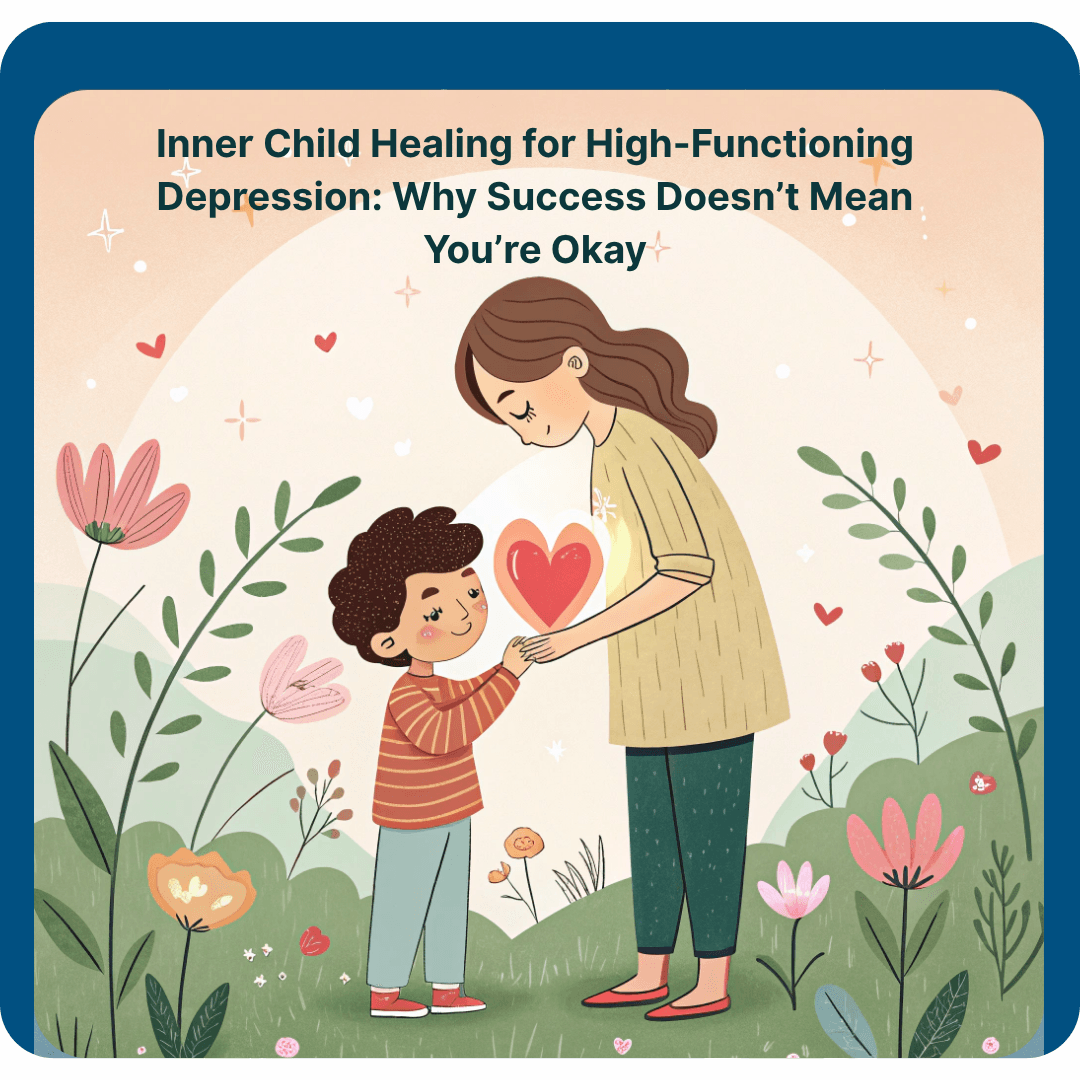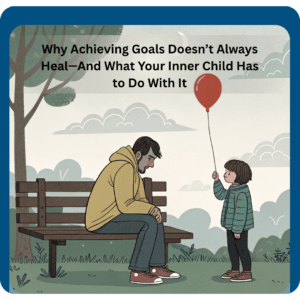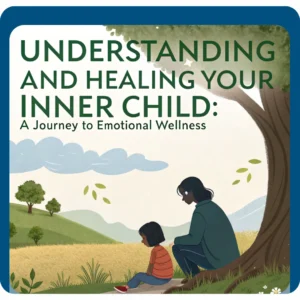Inner Child Healing for High-Functioning Depression: Why Success Doesn’t Mean You’re Okay
Table of Contents
Inner Child Healing Story
Inner Child Healing for High-Functioning Depression: Why Success Doesn’t Mean You’re Okay
“You’re doing amazing!”
That’s what everyone kept telling Riya.
She was 32, living in Mumbai, with a well-paying job in a creative agency, a stylish apartment, and a social calendar that looked just as vibrant as her Instagram. Her friends saw a confident, accomplished woman who had “figured it all out.”
But Riya had a secret.
Every night, when the city lights dimmed and the likes stopped rolling in, she lay awake—exhausted but unable to sleep. Her heart felt heavy, her chest tight, and her mind a storm of thoughts. She wasn’t okay… and she didn’t know why.
This is the reality for countless millennial women like Riya. High-functioning, high-achieving, and hiding a quiet but persistent sadness. Welcome to the world of high-functioning depression.
What is High-Functioning Depression?
High-functioning depression (sometimes referred to as dysthymia or persistent depressive disorder) doesn’t “look” like depression.
People with this condition often:
- Keep up with responsibilities
- Maintain social appearances
- Achieve career goals
- Seem upbeat on the outside
But underneath, they experience:
- Constant self-doubt
- Chronic fatigue
- Emotional numbness
- Guilt for feeling low despite “having it all”
- A sense of emptiness that success can’t fill
High-functioning depression in women is especially overlooked because society rewards performance, not emotional truth. The world applauds your output but rarely sees your inner world.
Success Isn’t the Same as Emotional Safety
Riya, like many of us, grew up equating success with worth. Good grades, gold stars, and constant praise became her coping mechanisms. Deep inside, she believed,
“If I keep doing everything right, I’ll finally feel good enough.”
But after years of climbing the ladder, she felt more anxious than ever. Her emotional life was a cycle of overthinking, people-pleasing, and perfectionism.
This is where inner child healing becomes crucial.
Your Inner Child Might Be Running the Show
Your inner child is the emotional, sensitive part of you that formed in early childhood. She carries your first experiences of love, rejection, fear, and safety.
If, as a child, you felt:
- You had to be “perfect” to be loved
- Your emotions were too much for others
- You had to earn approval by being helpful, quiet, or smart
- You were shamed for expressing anger or sadness
… then chances are, your inner child never learned how to feel safe just being you.
Instead, she learned to perform, achieve, and please—all to feel worthy of love.
As an adult, that same child runs your inner world. She shows up in your anxiety, your fear of failure, your exhaustion from trying to be everything to everyone.
How Inner Child Healing Helps High-Functioning Women?
Inner child healing allows you to reconnect with the younger version of yourself, offer her compassion, and rewire the beliefs that are keeping you stuck in high-functioning depression.
Here’s how it works:
1. Recognize the Pattern
Notice the moments where your inner child is reacting.
- Do you panic when you think someone is disappointed in you?
- Do you feel like a failure when you’re not “productive”?
- Do you always seek validation before making a decision?
These are signs that a younger, emotionally wounded part of you is in charge.
2. Start a Dialogue
Sit quietly. Close your eyes. Picture yourself as a child. What is she feeling? What does she need?
Say to her:
“You don’t have to be perfect to be loved. You are safe now. I see you.”
This may feel awkward at first, but over time, it builds emotional safety within.
3. Release the Performance Trap
Give yourself permission to just be. Not every task needs to lead to productivity. Not every emotion needs to be polished.
Try:
- Journaling without structure
- Dancing just for fun
- Saying “no” without guilt
- Resting without earning it
Family Roots: The Systemic Layer Behind Depression
Many women carry emotional burdens that don’t begin with them. Through Systemic Family Constellation therapy, we often uncover that high-functioning depression is tied to inherited family patterns.
Maybe your mother never rested and taught you to keep going no matter what.
Maybe your father praised success but ignored emotions.
Maybe grief or trauma from a past generation lives on in your nervous system.
Healing isn’t just about you—it’s about the story your family never got to finish.
A New Kind of Strength
Healing your inner child doesn’t make you weaker. It makes you real.
And in this world, authenticity is radical.
When you reconnect with that younger you, something shifts:
You stop needing to prove yourself.
You start choosing peace over perfection.
You become emotionally resilient—not because you’re always strong, but because you allow yourself to be soft.
Riya’s Turning Point
Riya reached out for help. Through inner child healing and alternative therapy sessions, she discovered she wasn’t “broken”—she was simply never taught how to rest, feel, and be loved without conditions.
She started journaling from her inner child’s voice. She paused to breathe before saying yes. She let herself feel… without judgment.
She’s still working in the same job. Her to-do list hasn’t shrunk. But her relationship with herself has completely changed.
“Now, I don’t just survive my days—I live them,” she said with a quiet smile.
You’re Not Alone. And You’re Not Broken.
If you’ve been feeling that silent sadness despite your success, know this:
💗 You’re not weak.
💗 You’re not overreacting.
💗 You’re not alone.
You’re a woman who learned to perform, achieve, and serve.
But now, it’s time to unlearn the patterns that no longer serve you.
Ready to Begin Your Healing Journey?
At The Healing Room, we offer one-on-one inner child therapy, family constellation therapy, and alternative holistic sessions designed especially for millennial working women navigating high-functioning depression and emotional burnout.
✨ Take a breath.
✨ Take your power back.
✨ Take the first step toward true, lasting healing.
📩 Book a free consultation today and begin the journey back home to yourself.
Final Words
Success is not a substitute for emotional safety. You can keep rising in your career and heal the parts of you that were never allowed to rest, feel, or be.
Your inner child doesn’t need you to be perfect.
She just needs you to listen.
You’ve done enough proving.
Now it’s time for healing.
🧡 You are safe.
🧡 You are worthy.
🧡 You are already enough.
——
Compiled and Written by
Sonali Mittra
FAQs
It's when someone appears successful and capable on the outside but feels deep sadness, fatigue, self-doubt, or emptiness inside.
Both have similar symptoms, but high-functioning depression is less obvious. People still maintain social and work responsibilities, so diagnosis or help often gets delayed.
By reconnecting with your younger self, recognizing past wounds, and learning self-compassion, inner child work helps reduce obsessive thoughts and the need for constant validation.
Because they often carry beliefs from childhood—like needing to perform, being perfect to earn love—which create internal pressure, emotional burnout, and disconnect despite success.
It’s a healing process where you reconnect with early childhood parts of yourself, understand unmet needs, reframe limiting beliefs, and create emotional safety within.
Yes. It addresses root emotional wounds that contribute to depression, anxiety, guilt, or shame and helps restore self-acceptance and deeper emotional balance.
Start with small practices: journaling childhood memories, feeling compassion for the younger you, speaking to a therapist or coach, guided meditations or visualizations.
Not always. Success may hide emotional pain. Emotional wellness means feeling safe, being able to rest, express feelings, and not just achieving.





I never thought Inner Child Healing could be connected to the cost of success. This blog opened my eyes to how past wounds can silently influence ambition.
Your perspective on Inner Child Healing and its impact on professional life is so unique. It’s something most people don’t realize until burnout hits.
This post beautifully explains how Inner Child Healing plays a hidden but powerful role in shaping success. Really made me reflect on my own patterns!
Such a powerful and nurturing read. Emotional resilience isn’t talked about enough, especially when it comes to long-term emotional recovery. Thank you for writing this.
The connection between self-awareness and emotional resilience really stood out to me. It’s rare to find content that blends emotional intelligence and healing this well.
Building emotional resilience has been a huge part of my healing journey, and this blog felt like a warm guidebook. Thank you for making the concept so relatable.
Wow, such a powerful read! I’ve been struggling with burnout despite achieving everything I once dreamed of. This post helped me understand how unhealed childhood patterns play a role. Inner child healing truly feels like the missing piece in my self-growth journey.
This article really hit home. I never realized how much my drive for success was masking unresolved emotional wounds from childhood. Thank you for shedding light on the importance of inner child healing — it’s something I’ve now decided to explore more deeply.
This article beautifully captures how inner child healing is not just a therapeutic concept—but a life-changing shift for overachievers navigating emotional burnout. I especially appreciated the reminder that success doesn’t equal emotional safety and the invitation to simply “be.” Your words are a powerful prompt to pause, rest, and reconnect with what truly matters.
I truly resonated with your exploration of inner child healing and its hidden tie to success. The story of Riya highlighted the emotional fatigue many high-achievers carry beneath their accomplishments. Your suggestions for journaling and starting a dialogue with the younger self felt refreshing and actionable. Thank you for showing us how to heal from within and redefine our worth beyond productivity.
For years I thought success would finally make me feel secure. But even after achieving so much, I still fear failure like a child. Inner Child Healing gave me hope that I can grow without constantly carrying old fears around with me
I always thought being emotionally tough was the key to success. But your post made me see how ignoring past wounds only makes life heavier. Inner Child Healing seems like the way to build a future that isn’t controlled by trauma or fear. Thank you for sharing this perspective
This article touched a very personal part of my life. We often pretend everything is fine because success looks good from the outside. But the inner child still carries hurt that needs attention. I’m grateful you wrote about something so often ignored yet so important
I’ve spent years proving I’m strong and independent, but reading this made me realise I’ve just been hiding my insecurities. Inner Child Healing sounds like the step I need to finally understand why I still fear judgment even as an adult. Beautifully written and eye-opening.
The way you connected success with emotional wounds was so relatable. Many of us keep running toward achievements hoping they’ll fix old pain. But Inner Child Healing teaches us that peace must come from inside, not from what others think of us. Thank you for this reminder
Thank you so much for this piece on Inner Child Healing. Reading Riya’s story made me realize how much I’ve been pushing myself — success doesn’t always mean emotional safety.
This really made me stop and reflect. I’ve always been the overachiever in my family, thinking success would finally earn me love. But when the applause fades, the emptiness remains. Inner Child Healing feels like a chance to rebuild self-worth from a kinder place
I didn’t realise how much my younger self still influences the way I handle pressure and relationships. Your blog on Inner Child Healing reminded me that success means nothing if the inner child feels unheard or unloved. I’m slowly learning to give myself the softness I missed growing up
This post on Inner Child Healing really made me reflect on my own patterns. It’s surprising how often we chase success without realizing the emotional cost we carry from childhood. I appreciate how you highlighted the quiet ways our inner child shapes our decisions — it’s a perspective that isn’t talked about enough. Definitely gives me a lot to think about on balancing ambition with self-care.
This hit me differently… never realized how my success habits were shaped by childhood patterns. Beautifully written.
Such a relatable take! I didn’t know inner child wounds could affect ambition this deeply. Eye-opening.
Amazing breakdown of inner child healing and how childhood beliefs can stick with us. The narrative and explanations made it easy to understand and reflect on.”